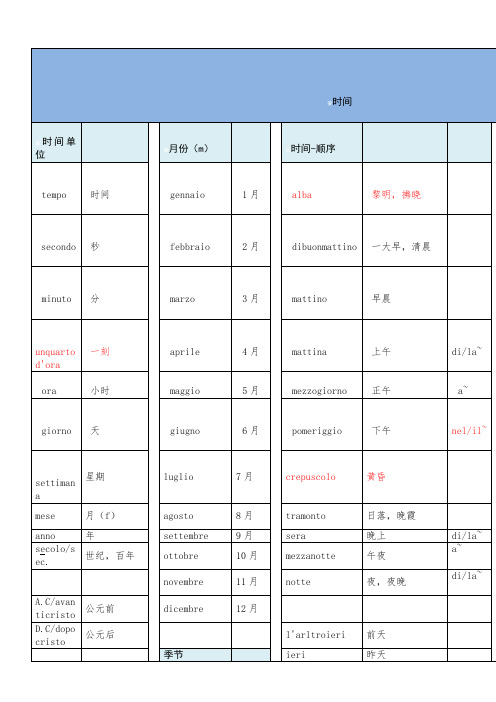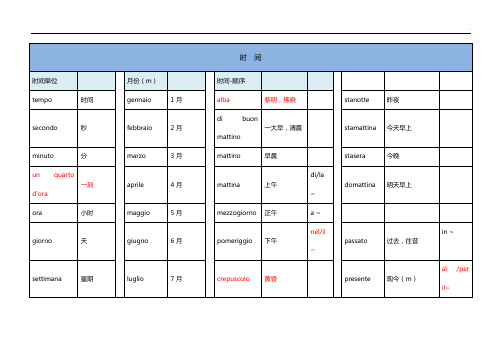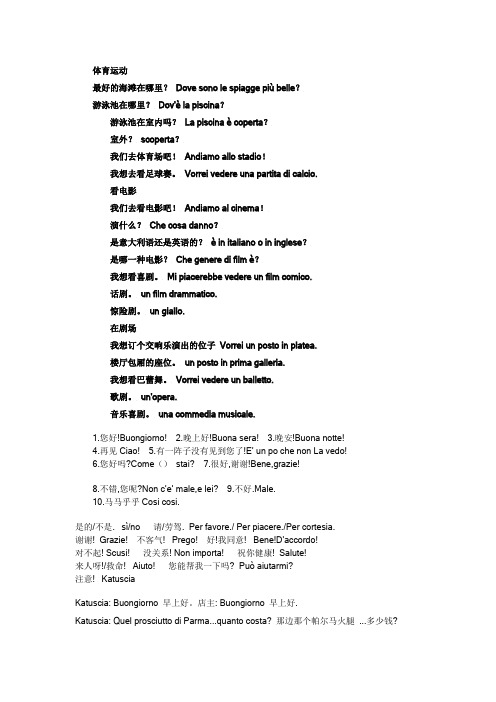意大利语 基础单词与日常用语复习课程
意大利语基础知识复习

I名词的性数关于名词的性、数以及和形容词、冠词的搭配1 名词的性分为两种:1) 有生命的词,比如:教授,老师,学生,狗,猫,狮子等等,这样的词既有词性也有性别;在大部分情况下,词性和性别是对应的,例如:Lupo 公狼lupa 母狼Gatto公猫gatta 母猫Cavallo 公马,cavalla 母马,professore 教授(男)professoressa 教授(女)marito 丈夫, moglie 妻子figlio 儿子figlia 女儿2) 无生命的词阳性:capo , capello , linguaggio , occhio , orecchio , sole , cappello , innamoramento , isolamento 等阴性:sedia , banca , terra , mela , pera , porta , uscita , mano , lingua , luna , missione ,carta regola 等2名词的性阳性名词的词尾有1 以o结尾的;大部分以o结尾的单数名词是阳性,例如Ragazzo , marito , muro , naso , occhio , capo , cavallo , lupo 等2 以e结尾的;有一些是阳性,例如Professore , attore , dottore , fiore , insegnante, signore等3 还有一些词,(不多),词尾是a 他们也是阳性,例如,Tema , sistema,problema等阴性名词的词尾有1) 以a 结尾的,大部分是阴性,例如:Ragazza , stanza , figlia , cavalla , lupa , amicizia 等2 )以e 结尾的,有一些是阴性,例如:Moglie , situazione , dichiarzione , chiave , attrice 等3)所有以à 结尾的单词都是阴性,所有以i 结尾的单数名词也都是阴性。
意大利语 基础单词与日常用语

vicinoa
在...附近
MarGlacialeArtico
北冰洋
lontanoda
距离…远
dentro
在...里
difrontea
在...对面
asinistradi
在...左
adestradi
在...右
aldifuoridi
fuori
在…外面
alfiancodi
在旁边
国家
大区
城市
UnioneEuropea
mancano15minutialle10
mancaunquartod’oraalle10
9:45
poi...
l'annoprossimo
pomeridiano
下午的
dopo...
serale
晚上的
时刻表
notturno
夜间的
piùtardi...
questalezionecominciaalle9efiniscealle17
日耳曼
Sardegna
撒丁岛
Cagliari
卡利亚里
Olanda
olandese
荷兰
gallo
高卢
Sicilia
西西里
Palermo
巴勒莫
Finlandia
finlandese
芬兰
visigoto
西哥特
Danimarca
danese
丹麦
vandalo
旺达尔
Calabria
卡拉普里亚
Catanzaro
fine-settimana
周末(m)
钟表
日期(data)
意大利语学习资料大全

意大利语学习资料大全第一篇:意大利语学习资料大全意大利语学习资料大全一、书籍篇(一)学习教材:1、《速成意大利语》,赵秀英着,外文出版社2000年出版,上下两册个人认为,这是国内自学意大利语最好的教程,讲解很详细,语法点全部讲到,对个别重点词讲解很到位,还有意汉对比。
在两本书的容量里做到这点很不容易了,强烈推荐短期自学者使用。
推荐的相应课程是万语网的视频学习意大利语课程2、《意大利语》,王军、王焕宝等编,外语教学与研究出版社1988年出版,共四册这是一般意大利语专业使用的教材。
此教材很老了,内容相对陈旧,很多范文都是中国人写的,所谓的中式意语;不过,它的内容相对很简单,而且很多是关于中国的,要学习如何表达中国的一些概念,看看它的表达方法还是很好的。
我把它当作泛读教材用。
3、《自学意大利语》,肖天佑编,商务印书馆1983年出版,全一册市面上已买不到了,从图书馆复印的。
还来不及怎么看,不过它有点好,他在词汇里对不规则的重音的单词在下面以点标注,这对自学者可是很有帮助,而且它的练习还有答案,课文有中文译文。
4、《意大利语初学手册》,黄美婷编,上海外语教育出版社2003年出版从英语翻译过来的,很不错,深入简出。
编排非常合理,很为读者着想,国内的教材什么时候能够做到这样啊。
采取讲故事的方式,很吸引人。
可作为初学者泛读教材。
5、《意大利语入门》,沈萼梅编,外语教学与研究出版社1986年出版适合学音乐专业的,讲多了很多音乐专业的术语的意语表达方式,对一般意语学习者不是很适合。
(二)词典:1、《意汉词典》,商务出版社1985年出版没有选择的“绿砖”,国内的意大利语词典,这本最大最好啦,词汇量很大,相信国内意大利语学习者绝对少不了它。
2、《现代意汉汉意词典》,外语教学与研究出版社2000年出版词汇量太小,而且查动词的变形时极不方便(不如绿砖后面有一个elenco可查页码)。
唯一的优势是小一点,好带一些,还有中意部分。
意大利语基本词汇教学文稿

意大利语基本词汇意大利语基本词汇(英-意)Basic(基本词汇)Hello -------Ciaoyes -------sino -------noGood morning---B uon giorno Good night -----Buona notte Goodbye -------Arrivederci Thank you ------Graziewhat -------che cosawhich -------chewhere -------dovewhen -------quandohow much/many--quanto who -------chiwhy -------perchèhow -------comePlease -------Pregoand -------eonly -------soltantoa little -------un pòalso -------anchetoo -------troppobut -------mamaybe -------forse something ------qualcosa someone -------qualcuno Excuse me ------Scusi Nouns(名词)book -------libropen -------pennatable -------tavoloman -------uomowoman -------donnachild -------bambinoboy -------ragazzogirl -------ragazza student -------studente car -------macchina language -------lingua tourist -------turistacity -------cittàmoney -------moneta store -------provista restaurant -----ristorante family -------famiglia mother -------madre father -------padresister -------sorella brother -------fratello water -------acquaday -------giornonight -------notteevening -------sera morning -------mattina afternoon ------pomeriggio breakfast ------colazione lunch -------colazione dinner -------pranzofood -------cibochair -------sediafriend -------amiconewspaper------giornalehusband -------maritowife -------moglieVerbs(动词)ask -------domandarespeak -------parlareknow -------conoscere (person/place), sapere (fact) see -------vederedo/make -------fareeat -------mangiaredrink -------bereunderstand-----capirewant -------volerestudy -------studiarelearn -------impararesit -------sedereneed -------avere bisogno digo -------andarelive -------abitare (inhabit), vivere (be alive)come -------venirebuy -------compraresell -------venderelook for -------cercarework -------lavorarevisit -------visitaresmoke -------fumarelike -------piacerelove -------amarepay -------pagarehear -------udirethink -------pensareAdjectives(形容词)beautiful--bellopretty-----bellinonice-------piacevolebig--------grandesmall------piccologood-------buonointeresting---interessantesick-------malatocold-------freddohot--------caldonew--------nuovoold--------vecchionear-------prossimofar--------lontanoAmerican---americanoEnglish----ingleseFrench-----franceseSpanish----spagnoloRussian----russoChinese----cinesePronouns(代词)I -------ioyou -------tu (informal singular), voi (informal plural), lei (singular formal), loro (plural formal)he -------luishe -------leiwe -------noithey -------loroI am -------io sonoyou are -------(tu) sei, (voi) siete, (lei) è, (loro) sonohe is -------lui èshe is -------lei èwe are -------siamothey are -------loro sono下面看一些正确句子,加深理解:Io ho un libro我有一本书Tu hai un libro.你有一本书Lui ha un libro.他有一本书.Noi abbiamo un libro我们有一本书Io ha una matita.我有一支铅笔Lei ha una matita她有一支铅笔Voi avete una matita你们有一支铅笔Loro hanno una matita。
意大利语基本单词与日常用语

一夜,一宵
linea del tempo
时间轴
è ora di ...
oggi è il primo ottobre 2012.
le ore piccole
凌晨,午夜以后
mesi e mesi
一连几个月
时间表达
顺序表达
il 18 gennaio,2010
biennio
两年
Che ora è?/Che ore sono?
odierno
今日的,现今的
è mezzanotte/zero
24:00
地 理
方位
大洲
nord
settentrione
settentrionale
北,北方(m)
北方的
in basso
在下端,在底部
Europa
europeo
欧洲
in fondo
在尽头,在底部
Asia
asiatico
亚洲
sud
meridione
nel febbraio del 1982
ventennio
二十年
sono le 9(in punto/precise)
9:00(整)
prima di ...
nel 1982
sono le 9 e un quarto
9:15
nel dicembre scorso
diurno
白天的
sono le 9 e 15
oggi
今天
era
时代,年代,纪元
lunedì
星期一
primavera
primaverile
春
春天的
domani
意大利语词汇学习:意大利语学习第一课

意大利语词汇学习:意大利语学习第一课意语学习内容由编辑整理。
Lesson 1This Week's New Words:ciao - hello, goodbye (familiar)salve - helloaddio - goodbyebene - wellegli - he (literary)lui - he (common speech), himella - she (literary)lei - she (common speech), heresso - it (masculine)essa - it (feminine)essi - they (persons or things)loro - them (persons or things), they (common speech, persons)grazie - thank youspiacente - I'm sorrynoi - us, we (plural)signore - sir, mister, mr.signora - madame, mrs.signorina - misstu - you (informal)voi - you (plural, formal and informal)io - INumbers 1-100 zero1 uno2 due3 tre4 quattro5 cinque6 sei7 sette8 otto9 nove10 dieciPronunciationThe Italian alphabet is fairly similar to our own (English, or depending on where you're from, American). The letters K,J,W,X,Y occur only in foreign origin words. Each lesson will explain a few more letters. This week, I'll explain the interesting letters (or combinations thereof) from this week's words (above).gliThe gli (followed or not by another vowel) in Italian is pronounced more or less as ll in SpanishHowever there are words like glicine (flower name), negligente, anglicano in which, for etymological reasons, g and l are pronounced as two separate sounds as in English.Thus, the Italian word coniglio (rabbit) is pronounced like conihlyo. and the word conigli (rabbits) is pronounced like conihli.gnThe gn is the same sound as Spanish ? i.e. is the same sound as the ny pair in the word canyon.Thus, signore is pronounced like sin-yore.hThe Italian h is always silent and as such an Italian speaker won't pronounce it when it occurs in foreign origin words (e.g.hotel). Moreover the letter h in Italian occurs only in the groups ch and gh (see below) and in the present tense of the verb to have. Thus, ho ( [I] have ) is pronounced o and hanno ( [they] have) is pronounced anno, the same as the word anno (year).a, e, i, o, uThe Italian vowels have only one sound, regardless of what letters they precede or follow, or accent marks on the vowel, with the (minor) exception of e and o.aThe a is always pronounced as in the English word car.eThe e has the sound of the e in bed. Actually there are two sounds of e :an OPEN one, indicated with the grave accent : è a CLOSED one, indicated with the acute accent : é Note however that such accents are NOT normally written (unless they are required for tonic reasons), and appear only in dictionaries. Moreover, dictionaries report an ideal Tuscan pronunciation which is subject to ample regional variations. For instance the words perché (why) and stélla (star) are usually pronounced in the North as perchè and stèlla. In general a mispronunciation at this level won't b e noticed, or if it is noticed (for instance méla (apple) is pronounced everywhere like that, and if you pronounce mèla it will sound funny) you will be understood. There are words in which a difference in accent causes a different meaning, as in pèsca (pe ach) and pésca (fishing), but in the North we pronounce both words as the first one and are understood everywhere.A note on accents : dictionaries indicate the tonic accent, i.e. put an accent on the vowel in the stressed syllable in the word (this is in the vast majority of cases the last but one, so calledplain or flat words). This accent is not used and not required in normal writing. In normal writing the accent is required ONLY if the word ENDS with an accented vowel (i.e. the last syllable is accent ed, so called truncated words), e.g. perché. In handwriting do not bother to use the acute or the grave accent, just put any little sign over the vowel. On typewriters with Italian keyboards there are accented keys. On computer keyboards we usually prefer to use ASCII keyboards without accented keys, and just use an apostrophe instead of the accent, e.g. perche' : it is simpler and more portable.iThe Italian i is the same as the English long e or ee as in see.oThe o is always pronounced as the o in the word cold or dog. Here too actually there are two sounds of o :an OPEN one, indicated with the grave accent : ò (similar to dog) a CLOSED one, indicated with the acute accent : ó (similar to cold) The same comments made above for the letter e hold.uThe Italian u has the sound of the English oo as in too or the English ue as in blue.rAs opposed to the English r, which is formed in the back of the mouth with the back of the tongue, the Italian r is formed using the tip of the tongue on the upper palate, behind the front teeth, more like the English d.________________________________________Being the first lesson, this week you're just learning some of the basics. The main emphasis is on pronouns (io, lei) and numbers (zero through dieci). Also, you're being introduced tosome of the most common greeting and short phrases, such as salve (hello) and spiacente (I'm sorry).Without knowing any verbs, there aren't many sentences to be made with the words we have, but here are some (short) examples with what we know:Salve, signorina. - Hello, miss.Spiacente, signore. - I'm sorry, sir.And yes, that's about all we can do right now, but these are still good examples of Italian grammatical structure. Notice how similar the above sentences are to English - salve comes first, and then the subject, signorina. You can form the same kinds of sentences using addio and grazie, and signora, in addition to the example sentences above. However, you can't make a sentence like this:Salve, lei.What the above sentence literally says is hello, you, and while it may be possible to think of times in English when you might say that, in Italian the sentence is meaningless, and people will look at you funny if you say Salve voi! in the middle of a group of Italian-speaking people. You could however say Salve a voi! (literally hello to you), although it sounds slightly unusual.Numbers. Numbers, as you should all know, are important. That's why I've included some in the first lesson. For the moment, you only know the numbers between 0 (zero) and 10 (dieci), but that will change. What can you do with the numbers zero through dieci? Count your toes! Uno, due, tre, quattro, cinque, sei, sette, otto, nove, dieci…… Recite your phone number! cinque, cinque cinque, otto, sei, zero, due (555-8602); note that however in Italian it is usual to pronounce phone numbers by group (i.e. as it were five-hundred-and-fifty-five eighty-six zero-two) but you'llwait for another lesson for that. Tell someone how many sisters you have (due). What you can't do with the numbers zero through dieci is make numbers bigger than dieci by stringing them together. Due zero is not the same as 20, although if you were in a pinch, you might be able to make someone understand that 20 was what you meant. Don't worry, we'll get to the rest of the numbers (1-1000) in the next few lessons.Pronouns. Pronouns (io, tu, Lei, egli, ella, noi, voi, essi, and loro) aren't anything that you can actually use yet, because I haven't given you any verbs. But as we progress, pronouns will be very important, so I'm introducing them now. The Italian pronouns are used almost always exactly the same way they are in English. In English, you would sayI went to the store.In Italian, you would just substitute io for I in the sentence above (we'll pretend that the rest of the sentence is really in Italian) and end up withIo went to the store.Trust me, how one uses these pronouns will make much more sense when we learn some verbs.。
②意大利语 课文+会话+词汇 +小朗读+附加常用问候单词和句子

课文TESTO
Programma per un fine settimana
周末计划
Da molti anni in Italia si lavora cinque giorni alla settimana.很多年来在意大利人们每星期工作五天。
Oggi è venerdì, 今天是星期五,
②课文+会话+词汇 +小朗读+附加常用问候单词和句子
句型MODELLI DI FRASE
PRIMO 一
—Sai che sono tornati i suoi gentitori? 你是否知道他们的父母?
Sì, lo so. 是的, 我知道这件事。
—Sai se lui aiuta Elisa studiare musica? 你是否知道他帮诶丽萨学音乐?
Ti porterò anche una sorpresa!我还会带给你一个惊喜!
F: Che sorpreso sarà?会是什么惊喜呢
P: Non posso dirti per ora.我现在不可以说。
Lo saprai solo quando sarò arrivato a casa tua.我到了你家时你才会知道。
potremo andare con la sua macchina che molto veloce e comoda,我们就可以开他那辆很快很舒适的车去,
altrimenti dovrò andare con la mia vecchia "Cinquecento" .要不然我就要开我的老5百去。
Se incontrerò alcuni amici ci potrò fare tardi,如果碰到一些朋友我可以待到很晚,
意大利语词汇和常用句

体育运动最好的海滩在哪里?Dove sono le spiagge più belle?游泳池在哪里?Dov'è la piscina?游泳池在室内吗?La piscina è coperta?室外?scoperta?我们去体育场吧!Andiamo allo stadio!我想去看足球赛。
Vorrei vedere una partita di calcio.看电影我们去看电影吧!Andiamo al cinema!演什么?Che cosa danno?是意大利语还是英语的?è in italiano o in inglese?是哪一种电影?Che genere di film è?我想看喜剧。
Mi piacerebbe vedere un film comico.话剧。
un film drammatico.惊险剧。
un giallo.在剧场我想订个交响乐演出的位子Vorrei un posto in platea.楼厅包厢的座位。
un posto in prima galleria.我想看巴蕾舞。
Vorrei vedere un balletto.歌剧。
un'opera.音乐喜剧。
una commedia musicale.1.您好!Buongiorno!2.晚上好!Buona sera!3.晚安!Buona notte!4.再见Ciao!5.有一阵子没有见到您了!E’ un po che non La vedo!6.您好吗?Come()stai?7.很好,谢谢!Bene,grazie!8.不错,您呢?Non c’e’ male,e lei? 9.不好.Male.10.马马乎乎Cosi cosi.是的/不是. sì/no 请/劳驾. Per favore./ Per piacere./Per cortesia.谢谢! Grazie! 不客气! Prego! 好!我同意! Bene!D'accordo!对不起! Scusi! 没关系! Non importa! 祝你健康! Salute!来人呀!/救命! Aiuto! 您能帮我一下吗? Può aiutarmi?注意! KatusciaKatuscia: Buongiorno 早上好。
- 1、下载文档前请自行甄别文档内容的完整性,平台不提供额外的编辑、内容补充、找答案等附加服务。
- 2、"仅部分预览"的文档,不可在线预览部分如存在完整性等问题,可反馈申请退款(可完整预览的文档不适用该条件!)。
- 3、如文档侵犯您的权益,请联系客服反馈,我们会尽快为您处理(人工客服工作时间:9:00-18:30)。
ventennio
二十年
sono le 9(in punto/precise)
9:00(整)
prima di ...
nel 1982
sono le 9 e un quarto
9:15
nel dicembre scorso
diurno
白天的
sono le 9 e 15
nottata
一夜,一宵
linea del tempo
时间轴
èora di ...
oggi è il primo ottobre2012.
le ore piccole
凌晨,午夜以后
mesi e mesi
一连几个月
时间表达
顺序表达
il 18 gennaio,2010
biennio
两年
Che oraè?/Che ore sono?
时间
时间单位
月份(m)
时间-顺序
tempo
时间
gennaio
1月
alba
黎明,拂晓
stanotte
昨夜
secondo
秒
febbraio
2月
di buon mattino
一大早,清晨
stamattina
今天早上
minuto
分
marzo
3月
mattino
早晨
stasera
今晚
un quarto d'ora
今日的,现今的
èmezzanotte/zero
rinascimentale
文艺复兴时期的
èmezzogiorno
12:00
il/nel pomeriggio dalle 15 alle 19.
attuale
现在的,目前的
sone le 5 di pomeriggio
17:00
la bibliotecaèchiusa la domenica
odierno
oggi
今天
era
时代,年代,纪元
lunedì
星期一
primavera
primaverile
春
春天的
domani
明天
fase
阶段,时期(f)
martedì
星期二
dopo domani
后天
mercoledì
星期三
estate
estivo
夏
夏天的
anni '50
50年代
giovedì
星期四
il giorno prima
前一天
anno zero
零年
venerdì
星期五
autunno
autunnale
秋
秋天的
quell giorno
那天
primo '900
20世纪初
sabato
星期六
il giorno dopo
次日,第二天
Medioevo
中世纪
domenica
星期日
inverno
invernale
冬
冬季的
indomani
a che ora chiudono le banche?
epocale
时代的,时期的
circa le 9
9点左右
sono aperte anche il pomeriggio?
medievale
中世纪的
sono le 9 passate
刚过9点
qual'èl'orario di apertura della biblioteca?
settimanale
每周的
così...
l'orario del lezioneèdalle 9 alle 17
mensile
每月的
alla fine ...
il negozio apre alle 9 e chiude alle 19
bisestile
闰年的
sono appena le 9
刚好9点
...circa alle 9
…intorno alle 9
oggi è lunedì.
oretta
一小时左右
lancetta dei minuti
分针
gionata
白天
lancetta dei secondi
秒针
quanti ne abbiamo oggi?
serata
晚上,晚间
oggi ne abbiamo quindici.
notte
夜,夜晚
di/la ~
attimo
片刻,瞬间
A.C/avanti cristo
公元前
dicembre
12月
momento
时刻,片刻
D.C/dopo cristo
公元后
l'arltro ieri
前天
periodo
时期,阶段
季节
ieri
昨天
epoca
纪元,时代,时期
星期
stagione
季节,季候
presente
现今(m)
al /per il~
mese
月(f)
agosto
8月
tramonto
日落,晚霞
futuro
将来,将来时
in ~
anno年Βιβλιοθήκη settembre9月
sera
晚上
di/la ~
secolo/sec.
世纪,百年
ottobre
10月
mezzanotte
午夜
a ~
时期
novembre
11月
次日,第二天
all’~
Rinascimento
文艺复兴
fine-settimana
周末(m)
钟表
日期(data)
ogni giorno
每天
orologio
钟表,手表
A che ora ...?
che giornoè oggi?
mezz'ora
半小时
lancetta delle ore
时针
...verso le 9
几点了?
anzitutto ...
in/a setembre
triennio
三年
èl'una(in punto/precisa)
1:00(整)
per prima cosa ...
nel 1982,a febbraio
decennio
十年
èl'una e mezzo/mezza
1:30
prima ...
一刻
aprile
4月
mattina
上午
di/la ~
domattina
明天早上
ora
小时
maggio
5月
mezzogiorno
正午
a ~
giorno
天
giugno
6月
pomeriggio
下午
nel/il ~
passato
过去,往昔
in ~
settimana
星期
luglio
7月
crepuscolo
黄昏
dopo le 2 ...
giovedìscorso
mattinale
早晨的,上半天
sono le 9 e tre quarti
sono le 9 e 45
sono le 10 meno un quarto
sono le 10 meno 15 minuti
mancano 15 minuti alle 10
manca un quarto d’ora alle 10
9:45
poi ...
l'anno prossimo
pomeridiano
下午的
dopo ...
serale
晚上的
时刻表
notturno
夜间的
piùtardi ...
questa lezione comincia alle 9 e finisce alle 17
